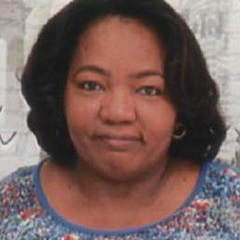
Maria Eugénia Gomes Alves
Maria Eugénia Gomes Alves holds a Master's degree in Heritage and Development and is currently a PhD candidate in Sociomuseology with the project financed by UNESCO Chair “Education, Citizenship and Cultural Diversity”: “Museology in Cape Verde - challenges, advances and perspectives. Case Studies: Ethnographic Museum of Praia and Museological Site of Lajedos”. She is a member of the ReLeCo Public Policies and Governance in Education.
Advisor: Maristela Simão
Áreas de interesse académico e científico Areas of academic and scientific interest
- Social and Cultural Anthropology
- Cultural Heritage and Museology
- Museology and Sociomuseology
Abstract
With this research project, it is proposed to know, describe and analyze the actions linked to the museology’s area in Cape Verde, in the post-national independence period. That is, based on two museological experiences or processes (Ethnographic Museum of Praia and Museological Site of Lajedos), this study seeks to understand the Cape Verdean museological context – its state of the art and future perspectives – under the lens of Sociomuseology. Because, taking into account that it was only after 1991 that museum infrastructures began to appear in the country, at a very slow pace and with a markedly normative typology (traditional museums), with this investigation it is intended to observe and verify to what extent one can speak of a Social Museology in Cape Verde, within the framework of the guidelines of Sociomuseology, as a School of Thought.
Some specific objectives to be achieved with this study were listed, among which the following stand out: identify and map the existing museological infrastructures on each island of the Cape Verde Archipelago and seek to know its structure and functioning; seek to understand what are the impacts of these museums on their territories, based on the assumption that they are useful tools at the service of social, cultural, environmental, economic development, etc. taking into account the line of research that “guides” this work, Sociomuseology, Heritage and Development; analyze the Programs of the successive Governments, regarding the preservation of the country’s cultural heritage, to understand the advances and setbacks, in terms of public policies for the sector; try to understand the reason for the almost total absence of community initiatives in the museology sector; trying to understand the changes that have taken place in the field of Cape Verdean museology, which have given rise to new ways of making museums. From traditional (normative), urban museums to museums such as Sitio Museológico de Lajedos, in which the focus is placed not on the collection, but on the search for improvements in people’s living conditions, in the well-being of individuals in this rural community. An “out of the box” museum typology considering the general context of the country.



